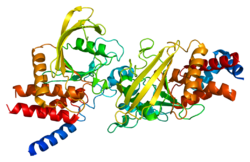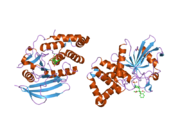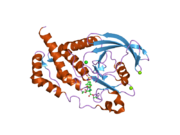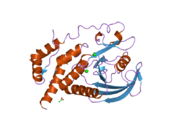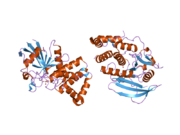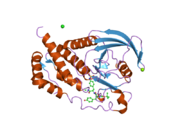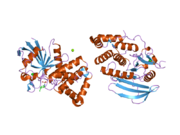From Wikipedia, the free encyclopedia
Protein-coding gene in the species Homo sapiens
PTPRB Available structures PDB Ortholog search: PDBe RCSB List of PDB id codes 2AHS , 2H02 , 2H03 , 2H04 , 2HC1 , 2HC2 , 2I3R , 2I3U , 2I4E , 2I4G , 2I4H , 2I5X
Identifiers Aliases PTPRB External IDs OMIM : 176882 ; MGI : 97809 ; HomoloGene : 2125 ; GeneCards : PTPRB ; OMA :PTPRB - orthologs RNA expression patternBgee Human Mouse (ortholog)Top expressed in endothelial cell lower lobe of lung visceral pleura right lung right ventricle parietal pleura upper lobe of lung upper lobe of left lung epithelium of colon Skeletal muscle tissue of biceps brachii
Top expressed in right lung right lung lobe left lung external carotid artery internal carotid artery carotid body left lung lobe digastric muscle lumbar subsegment of spinal cord triceps brachii muscle
More reference expression data
BioGPS
Wikidata
Receptor-type tyrosine-protein phosphatase beta or VE-PTP is an enzyme specifically expressed in endothelial cells that in humans is encoded by the PTPRB gene .[ 5] [ 6]
VE-PTP is a member of the classical protein tyrosine phosphatase (PTP) family. The deletion of the gene in mouse models was shown to be embryonically lethal,[ 7] vasculogenesis and blood vessel development. In addition, it was shown to participate in adherens junctions complex and regulate vascular permeability .[ 8] [ 9] Pyk2 kinase downstream of STIM1 -induced calcium entry mediates disassembly of the endothelial adherens junctions .[ 9]
VE-PTP contains an extracellular domain composed of multiple fibronectin type_III repeats, a single transmembrane segment and one intracytoplasmic catalytic domain, thus belongs to R3 receptor subtype PTPs.
The extracellular region was shown to interact with the angiopoietin receptor Tie-2 [ 6] VE-cadherin .[ 9] [ 10]
VE-PTP was also found to interact with Grb2 and plakoglobin through its cytoplasmatic domain.
Dysregulation of PTPRB correlates with the development of a variety of tumors. PTPRB promotes metastasis of colorectal cancer cells via inducing epithelial-mesenchymal transition (EMT).[ 11]
^ a b c GRCh38: Ensembl release 89: ENSG00000127329 – Ensembl , May 2017^ a b c GRCm38: Ensembl release 89: ENSMUSG00000020154 – Ensembl , May 2017^ "Human PubMed Reference:" . National Center for Biotechnology Information, U.S. National Library of Medicine .^ "Mouse PubMed Reference:" . National Center for Biotechnology Information, U.S. National Library of Medicine .^ "Entrez Gene: PTPRB protein tyrosine phosphatase, receptor type, B" .^ a b Fachinger G, Deutsch U, Risau W (October 1999). "Functional interaction of vascular endothelial-protein-tyrosine phosphatase with the angiopoietin receptor Tie-2" . Oncogene . 18 (43): 5948–5953. doi :10.1038/sj.onc.1202992 PMID 10557082 . ^ Bäumer S, Keller L, Holtmann A, Funke R, August B, Gamp A, et al. (June 2006). "Vascular endothelial cell-specific phosphotyrosine phosphatase (VE-PTP) activity is required for blood vessel development" . Blood . 107 (12): 4754–4762. doi :10.1182/blood-2006-01-0141 PMID 16514057 . ^ Broermann A, Winderlich M, Block H, Frye M, Rossaint J, Zarbock A, et al. (November 2011). "Dissociation of VE-PTP from VE-cadherin is required for leukocyte extravasation and for VEGF-induced vascular permeability in vivo" . The Journal of Experimental Medicine . 208 (12): 2393–2401. doi :10.1084/jem.20110525 . PMC 3256962 PMID 22025303 . ^ a b c Soni D, Regmi SC, Wang DM, DebRoy A, Zhao YY, Vogel SM, et al. (June 2017). "Pyk2 phosphorylation of VE-PTP downstream of STIM1-induced Ca2+ entry regulates disassembly of adherens junctions" . American Journal of Physiology. Lung Cellular and Molecular Physiology . 312 (6): L1003–L1017. doi :10.1152/ajplung.00008.2017 . PMC 5495943 PMID 28385807 . ^ Nawroth R, Poell G, Ranft A, Kloep S, Samulowitz U, Fachinger G, et al. (September 2002). "VE-PTP and VE-cadherin ectodomains interact to facilitate regulation of phosphorylation and cell contacts" . The EMBO Journal . 21 (18): 4885–4895. doi :10.1093/emboj/cdf497 . PMC 126293 PMID 12234928 . ^ Weng X, Chen W, Hu W, Xu K, Qi L, Chen J, et al. (April 2019). "PTPRB promotes metastasis of colorectal carcinoma via inducing epithelial-mesenchymal transition" . Cell Death & Disease . 10 (5): 352. doi :10.1038/s41419-019-1554-9 . PMC 6491493 PMID 31040266 .
Ramachandran C, Aebersold R, Tonks NK, Pot DA (May 1992). "Sequential dephosphorylation of a multiply phosphorylated insulin receptor peptide by protein tyrosine phosphatases". Biochemistry . 31 (17): 4232–4238. doi :10.1021/bi00132a012 . PMID 1373652 . Harder KW, Anderson LL, Duncan AM, Jirik FR (1993). "The gene for receptor-like protein tyrosine phosphatase (PTPRB) is assigned to chromosome 12q15-->q21". Cytogenetics and Cell Genetics . 61 (4): 269–270. doi :10.1159/000133419 . PMID 1486802 . Krueger NX, Streuli M, Saito H (October 1990). "Structural diversity and evolution of human receptor-like protein tyrosine phosphatases" . The EMBO Journal . 9 (10): 3241–3252. doi :10.1002/j.1460-2075.1990.tb07523.x . PMC 552056 PMID 2170109 . Gaits F, Li RY, Ragab A, Ragab-Thomas JM, Chap H (October 1995). "Increase in receptor-like protein tyrosine phosphatase activity and expression level on density-dependent growth arrest of endothelial cells" . The Biochemical Journal . 311 ( Pt 1) (Pt 1): 97–103. doi :10.1042/bj3110097 . PMC 1136124 PMID 7575486 . Feito MJ, Bragardo M, Buonfiglio D, Bonissoni S, Bottarel F, Malavasi F, Dianzani U (August 1997). "gp 120s derived from four syncytium-inducing HIV-1 strains induce different patterns of CD4 association with lymphocyte surface molecules" . International Immunology . 9 (8): 1141–1147. doi :10.1093/intimm/9.8.1141 PMID 9263011 . Nawroth R, Poell G, Ranft A, Kloep S, Samulowitz U, Fachinger G, et al. (September 2002). "VE-PTP and VE-cadherin ectodomains interact to facilitate regulation of phosphorylation and cell contacts" . The EMBO Journal . 21 (18): 4885–4895. doi :10.1093/emboj/cdf497 . PMC 126293 PMID 12234928 .
PDB gallery
2ahs : Crystal Structure of the Catalytic Domain of Human Tyrosine Receptor Phosphatase Beta
2h02 : Structural studies of protein tyrosine phosphatase beta catalytic domain in complex with inhibitors
2h03 : Structural studies of protein tyrosine phosphatase beta catalytic domain in complex with inhibitors
2h04 : Structural studies of protein tyrosine phosphatase beta catalytic domain in complex with inhibitors
2hc1 : Engineered catalytic domain of protein tyrosine phosphatase HPTPbeta.
2hc2 : Engineered protein tyrosine phosphatase beta catalytic domain
2i3r : Engineered catalytic domain of protein tyrosine phosphatase HPTPbeta
2i3u : Structural studies of protein tyrosine phosphatase beta catalytic domain in complex with inhibitors
2i4e : Structural studies of protein tyrosine phosphatase beta catalytic domain in complex with inhibitors
2i4g : Structural studies of protein tyrosine phosphatase beta catalytic domain in complex with a sulfamic acid (soaking experiment)
2i4h : Structural studies of protein tyrosine phosphatase beta catalytic domain co-crystallized with a sulfamic acid inhibitor
2i5x : Engineering the PTPbeta catalytic domain with improved crystallization properties
